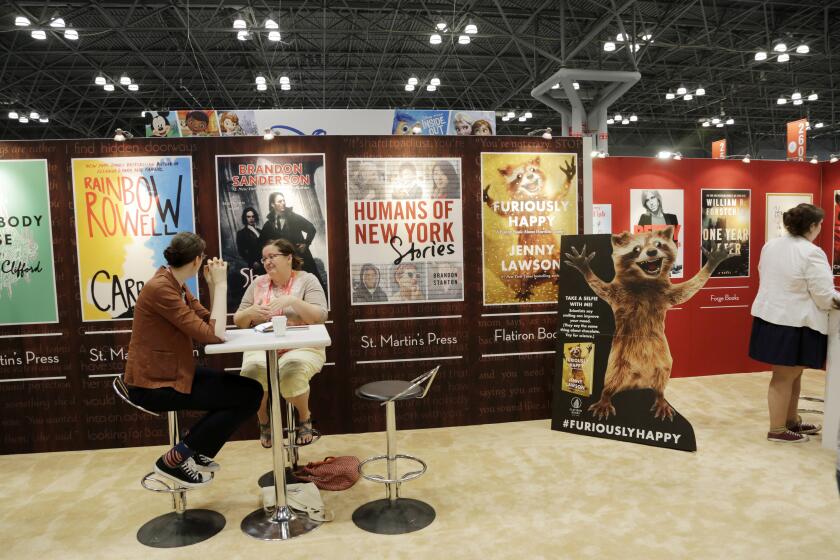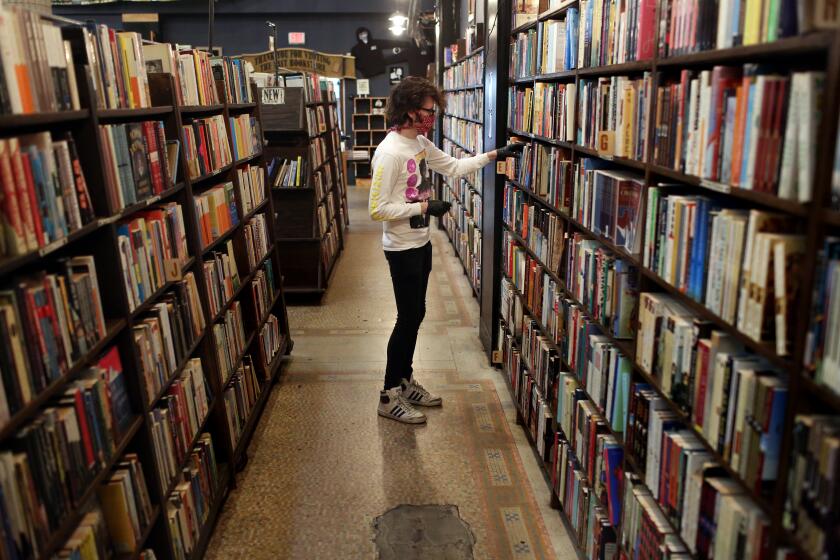A landmark publishing fair is on ice. Booksellers are wistful but hardly surprised
- Share via
BookExpo will not be held in 2021, ReedPop announced Tuesday. In fact, the largest book publishing convention in the U.S., established in 1947 as the American Booksellers Assn. Convention and Trade Show, will not be back in its current form at all.
The trade fair was postponed from May to July this year because of the COVID-19 pandemic and ultimately replaced with a six-day virtual event. With so much uncertainty still surrounding in-person events, ReedPop said in a statement that it would “retire the current iteration of events as they explore new ways to meet the community’s needs through a fusion of in-person and virtual events.” Retired along with the expo is BookCon, a consumer-facing fair immediately following the Expo that was launched in 2014, and the related show Unbound.
As news spread, publishers, booksellers and past attendees were grappling with a development that felt sudden but in some ways inevitable.
Markus Dohle, chief executive of Penguin Random House, told the Associated Press in a statement that he hoped these events would not be scrapped forever.
BookExpo, the largest bookseller trade show in the U.S., and its consumer-facing sibling BookCon have been indefinitely canceled because of the pandemic.
“We look forward to working with our industry partners to explore a newly imagined event where we all can come together to celebrate books and their essential role in our society and culture,” he said.
For many publishers, the fair represented a scrappy, analog way of doing business that was on the wane even before COVID-19.
“I always loved wandering around the halls seeing smaller independent publishers, academic publishers, gift publishers and librarians,” said Knopf publisher Reagan Arthur, who attended the convention for some 25 years. “For the trade, it’s been the closest publishing probably ever gets to any kind of glitz. And, yes, it was outdated in many ways, but it had some drama to it that was fun.”
For Arthur, it was a continual reminder that publishing is “largely a word of mouth business,” a profession powered by introverts that nonetheless has a strong social element. “We spend a lot of time amongst ourselves reading manuscripts, talking about publishing them,” Arthur said. “But once a year, having the chance to see the people who are recommending them to library patrons and selling them to bookstore browsers, it’s an intangible benefit, but I think it’s one that makes this business what it is.”
ViacomCBS has announced plans to sell Simon & Schuster to publishing giant Penguin Random House LLC for a whopping $2.18 billion next year.
For booksellers, most of them outside New York, the convention was a rare opportunity to get to know others in the industry — a place to network, meet publishers and authors face-to-face and plan their fall book purchases. It was also a fair in which, for all the celebrity authors and CEOs attending, indie booksellers were treated as the guests of honor.
Bert H. Deixler, co-owner of Chevalier’s Books in Larchmont Village, called the convention’s retirement “a loss for the bookselling community. We all benefited from being able to see ‘coming attractions’ and to chat with peers. It keeps getting worse for booksellers.”
Rick Simonson, senior book buyer at Seattle’s Elliott Bay Book Company, said that over 40 years, the conventions taught him much of what he knows about the industry. But in recent years, as it got smaller, it became clear to many booksellers that it needed “a serious rethinking.”
For John Evans, owner of Diesel bookstores in Brentwood and Del Mar, the announcement didn’t come as a surprise. “There’s something huge to be lost,” he said. “We’re all experiencing that loss this year.”
Still, Evans feels the expo was serving booksellers’ needs better when the indie American Booksellers Assn. ran it. (Reed Exhibitions bought the ABA Convention in the mid-’90s and rebranded it Book Expo America.)
“ABA was getting paid to do it and so the money circulated back to independent bookstores to some degree,” Evans said. But over the years, under ReedPop, he thought publishers gradually lost interest in promoting their books at the convention.
“Even without COVID, it was becoming more and more untenable as a thing,” he said. “I think COVID was the last stroke, but it was already suffering and scrambling in directions that contradicted each other.”
Several veterans of the fair noted its loss of focus. Paul Yamazaki, coordinating buyer at City Lights Books in San Francisco, has made the trip to BookExpo nearly ever year since 1985. “It wasn’t serving any specific people,” he said of recent fairs, “whether it was publishers, booksellers, authors, in a really clear way. And I think just in the last few years, there were some really valiant attempts to bring it back and to refocus, but it was still too little, too late.”
More casual fair visitors were less wistful. Maureen Palacios, owner of the children’s bookstore Once Upon a Time in Glendale, always felt the long trip to New York City wasn’t worth the expense; she traveled to the show only once.
“It was great because you got to meet lots of people, but it was sort of over-the-top and very, very commercial, and for us at the time, we didn’t really find any educational value to it.”
She found more value in ABA’s Winter Institute, another large industry gathering. As BookExpo has shrunk, the institute, a more focused fair founded by the ABA in 2005, has grown in influence. It will be held virtually in February 2021.
The event was “more specific to what we needed,” Palacios said, “so, unfortunately, I don’t see it as a big deal for us.”
Vroman’s and Book Soup Chief Executive Julia Cowlishaw, lamented the news but echoed Palacio’s point in an email. “The increasing expense of travel and hotels has meant fewer of us attend each year,” she said. “The timing is perfect for re-imagining BookExpo and I look forward to the next iteration.”
Like their peers across the U.S., booksellers in L.A. are adjusting to partially reopening their stores for curbside pickup amid the coronavirus.
For Allison K. Hill, CEO of the ABA, the news marked the conclusion of a long chapter.
“The retirement of BookExpo feels like the end of an era,” she told the AP. “For now, we’ll keep bringing everyone together virtually.”
The challenge now, especially for those steering publishing through an era of ever greater consolidation, is to adapt to new realities.
“Many of us will miss these gatherings,” said Simon & Schuster Chief Executive and President Jonathan Karp in an email. “But we’re confident we’ll continue to find effective new ways of making booksellers, librarians, and literary enthusiasts aware of our forthcoming books.”
Yamazaki of City Lights put the changes in perspective. “As much as we regret having the loss of BookExpo, the conversations will continue. That is really one of the things that hasn’t changed in my five decades of being a bookseller, is that the conversations face-to-face are still one of the key aspects of the book world.”
On social media, some authors and longtime BookExpo attendees lamented the news and shared their favorite BookExpo memories. Some of their reactions are below.
More to Read
Sign up for our Book Club newsletter
Get the latest news, events and more from the Los Angeles Times Book Club, and help us get L.A. reading and talking.
You may occasionally receive promotional content from the Los Angeles Times.













